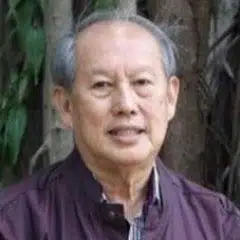Kishida's political agenda in granting state funeral to Abe
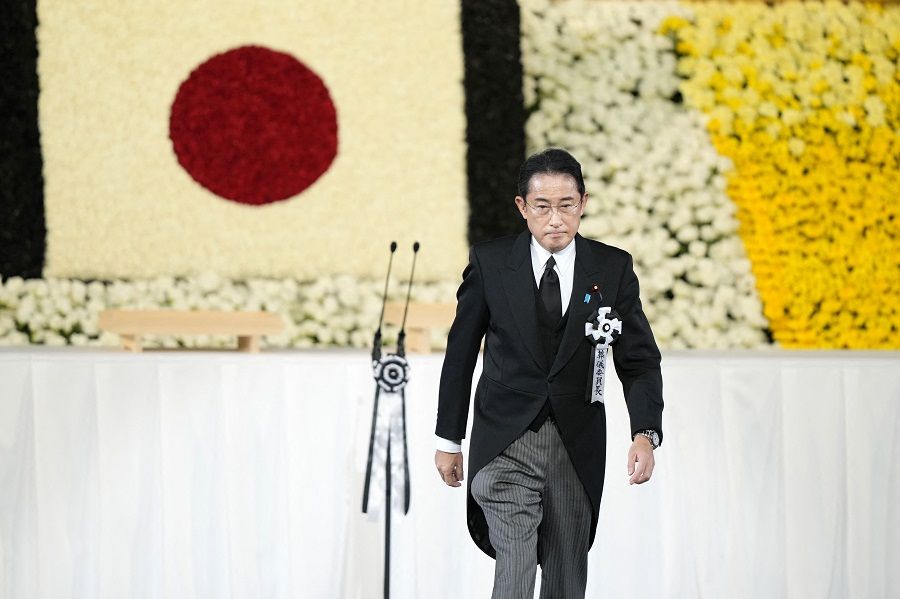
Former Prime Minister Shinzo Abe's controversial state funeral was held on 27 September, but attention quickly shifted to the 50th anniversary of the normalisation of diplomatic ties between China and Japan on 29 September and the future of the relationship between the two Asian powers.
The media focused on Japan's "condolence diplomacy" and compared Abe's state funeral with Queen Elizabeth's state funeral that took place a week earlier, including the expenses and extravagance. However, the simple question that the Japanese people are most concerned about is perhaps: why is Abe accorded a state funeral?
Japanese Prime Minister Fumio Kishida has articulated several reasons for this. First, Abe is the longest-serving prime minister in Japan's constitutional history. Second, Japan opposes and condemns violence as Abe was assassinated by a gunman. Third, as a politician, Abe has made great contributions to the country.
State funeral unrelated to long tenure as prime minister
However, detractors believe that being the longest-tenured prime minister is not a reasonable explanation for being accorded a state funeral. When Abe stepped down, the Japanese media, including pro-government newspapers, made a relatively fair statement that "he has not achieved much despite the longest tenure".
Since these two "monsters" and former prime ministers were not accorded the honour of state funerals, ordinary Japanese citizens, including the conservatives, are not convinced that Abe deserved a state funeral...
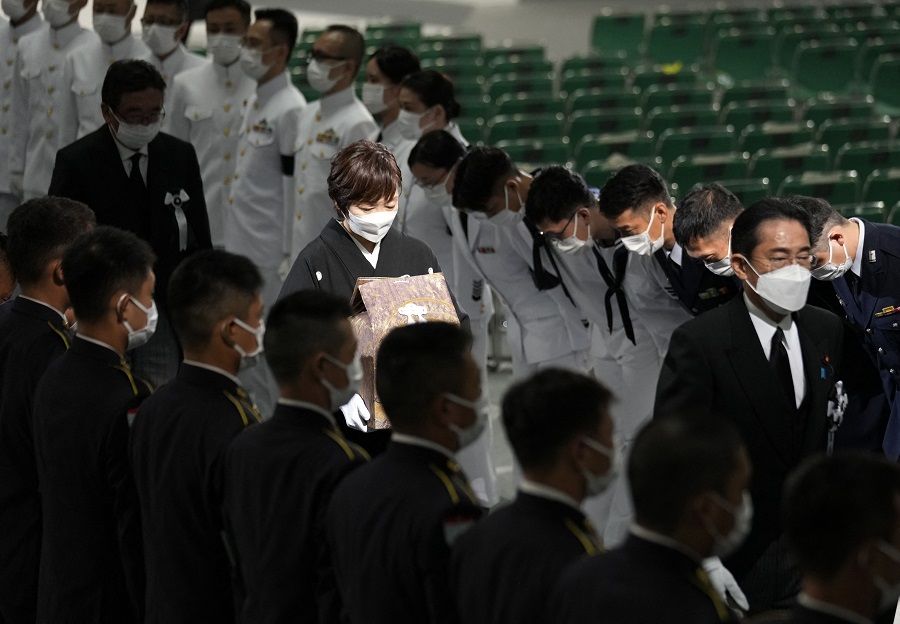
To the conservatives who are most supportive of Abe's politics, as long as Abe has not relieved Japan of the post-war system, which includes constitutional amendments, his accomplishments would be a far cry from those of the two "political monsters".
One of these "monsters" is former Prime Minister Nobusuke Kishi, Abe's maternal grandfather and a class-A war criminal, also known as the "Monster of the Showa era". The other is former Prime Minister Yasuhiro Nakasone, who advocated to "finalise the settlement of post-war politics" and was regarded as the "Monster of the Heisei era".
Since these two "monsters" and former prime ministers were not accorded the honour of state funerals, ordinary Japanese citizens, including the conservatives, are not convinced that Abe deserved a state funeral simply because he inherited "the excellent political genes of Kishi" as a privileged descendant, long occupied the position of prime minister, and unexpectedly came to a violent demise.
There is greater controversy regarding Abe's contributions. Putting aside the sensitive issues of constitutional amendment and military deployment that resulted in national debate, Kishida has listed Abenomics as an example that once propelled part of Japan's economy, bringing cheer to the Japanese stock market as well as increasing Japan's export and trade through excessive quantitative easing and issuance of government bonds that devalued the yen. However, they brought no practical benefit or significance to the salaried class. Coupled with the two-time increase in consumption tax and the impacts of inflation and Covid-19, many economists and the people are critical of Abenomics, blaming it for widening the "economic gap".
To the people, Abe was far from a "noble, kind and great statesman" that deserves a state funeral funded by the country, especially when Japan is currently in financial dire straits.
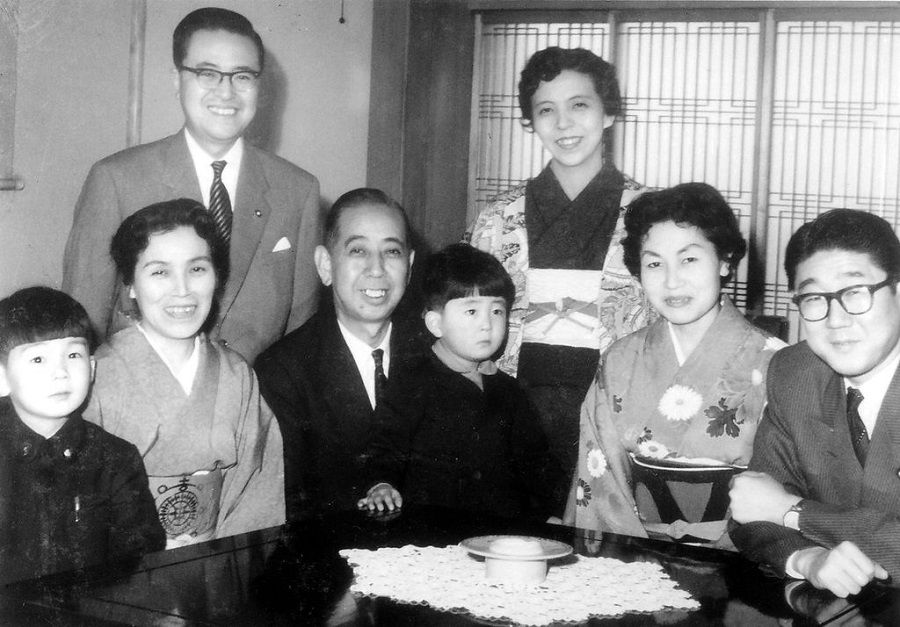
In addition, Abe was repeatedly suspected of and condemned for malfeasance involving the abuse of power and money when in office, such as the Senyou Academy, Kake Educational Institution and Sakura party scandals, which have yet to be settled. To the people, Abe was far from a "noble, kind and great statesman" that deserves a state funeral funded by the country, especially when Japan is currently in financial dire straits. In an opinion poll by Kyodo News, the 60.8% of the respondents who are against or disapproved of Abe's state funeral evidently illustrates this.
Stark contrast to Yoshida's state funeral
In post-war Japan, the only political figure who had a state funeral was former Prime Minister Shigeru Yoshida, who formed successive governments after the Second World War from 1946 to 1954. This was the only exception.
After the Second World War, Yoshida led the defeated Japan in fully seeking refuge with the US, which was the sole occupier of Japan. When the Treaty of San Francisco came into effect in 1952, he activated the Japan-US Security Treaty. He followed the lead of the US in all domestic and foreign policies, enabling Japan to make a fortune through addressing the special needs of the Korean War and Vietnam War.
There were of course opposing voices within Japan, which deeply feared that the political elites were putting the fate of the country, which had just emerged from the horrific war, in the hands of the belligerent US. Due to prevailing conditions then, the pro-US Yoshida cabinet re-established Japan through trade and disallowed Japan from maintaining a military. Overall, Yoshida was widely credited with leading Japan's revival from post-war ruin.
The respective styles and political impacts of Yoshida's and Abe's state funerals are indeed stark in contrast.
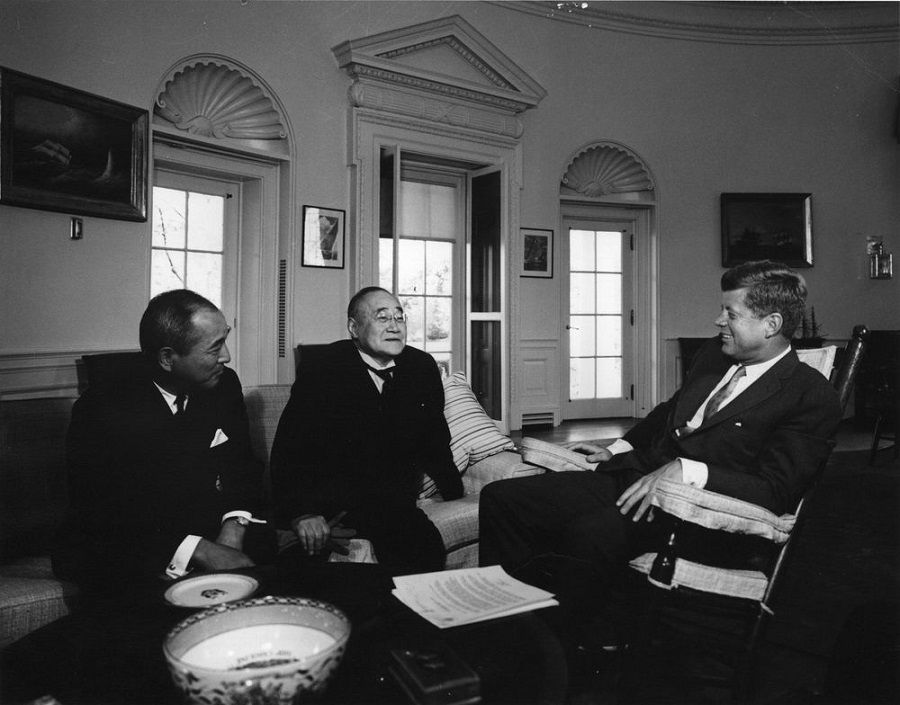
Yoshida's state funeral in 1967 took place at a time when Japan was divided by a dichotomy of views regarding its future, and many opposed the policies of Yoshida and then Prime Minister Eisaku Sato. At the time, I was studying at Waseda University, regarded as the centre of student movements. Although there were posters at the university campus depicting opposition to Yoshida's state funeral and Sato's government, they were incomparable to Japanese university students gathering and marching beyond the campus in protests and demonstrations.
From recollection, footage of Yoshida's state funeral and documentaries of his life were repeatedly broadcast on television for the entire day, and the mood was solemn. Abe's state funeral, in contrast, attracted far greater attention regarding the merits of Kishida's condolence diplomacy and the comparisons with the ceremonious state funeral of Queen Elizabeth, instead of the value of Abe's political legacy.
Added to these were the contrasting voices of the mourners who offered flowers and those who opposed the state funeral both inside and outside the funeral venue. The respective styles and political impacts of Yoshida's and Abe's state funerals are indeed stark in contrast.
Pandering to the Abe faction to consolidate power
Having survived decades at Nagatacho, the seat of Japan's political power, the veteran politician in Kishida must surely understand the huge difference between Yoshida's and Abe's legacies in post-war Japanese politics as well as anticipate the possible repercussions of Abe's state funeral.
Why did this intelligent politician hastily announce holding a state funeral for Abe, his strong rival in the Liberal Democratic Party (LDP), so soon after his assassination and before gaining complete clarity of the situation?
Kishida's attempt to bundle his political fate with Abe or the Abe faction may not be beneficial to his power consolidation.
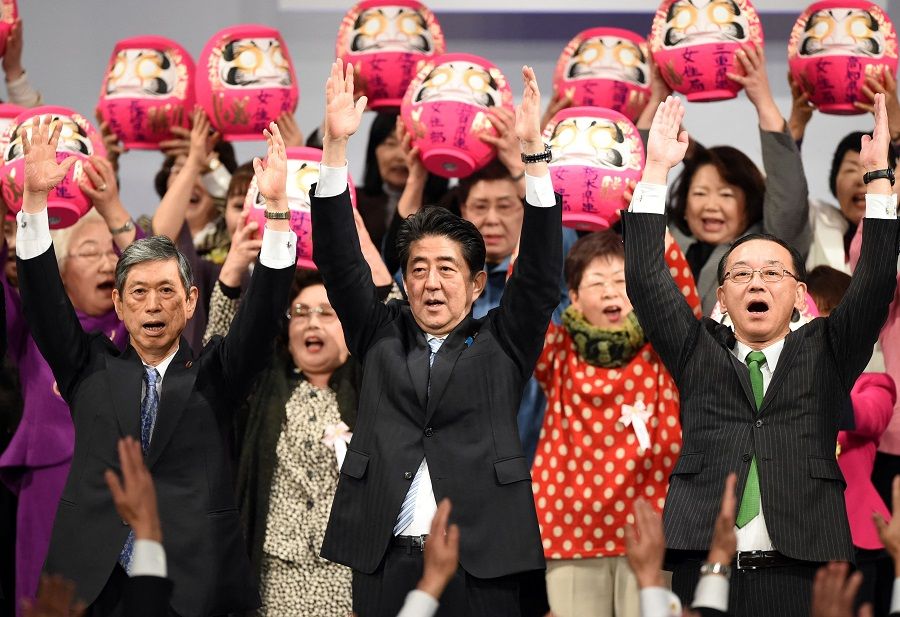
A common and simple deduction is that Kishida, from the weaker LDP faction, was pandering to the Abe faction, the largest in the LDP. In addition, he was attempting to unite the LDP factions through Abe's assassination as part of his strategy to consolidate power.
Based on the results of the Japanese upper house elections and the attempts to balance the LDP factions so far, Kishida's strategy of holding Abe aloft is probably successful. However, based on the revelations about the assailant Tetsuya Yamagami regarding his motives and reasons for assassinating Abe as well as the ensuing reactions, Kishida's attempt to bundle his political fate with Abe or the Abe faction may not be beneficial to his power consolidation.
Undoubtedly, the perpetrator's violence is roundly rejected and condemned. However, the exposed, cosy relationship between the Korean Unification Church and the LDP has given Kishida a headache, which he is struggling to deal with.
The post-war Japanese Constitution explicitly requires the separation of religion and the state, in view of the lessons from their integration in the pre-war military era. In reality, the Korean Unification Church and LDP politicians have long had a close relationship, particularly so in the cases of Abe's maternal grandfather Nobusuke Kishi and the yakuza.
What is particularly shocking is that Abe's younger brother and Minister for Defense Nobuo Kishi has publicly admitted that he is friendly with Unification Church members, who have helped him in the elections.
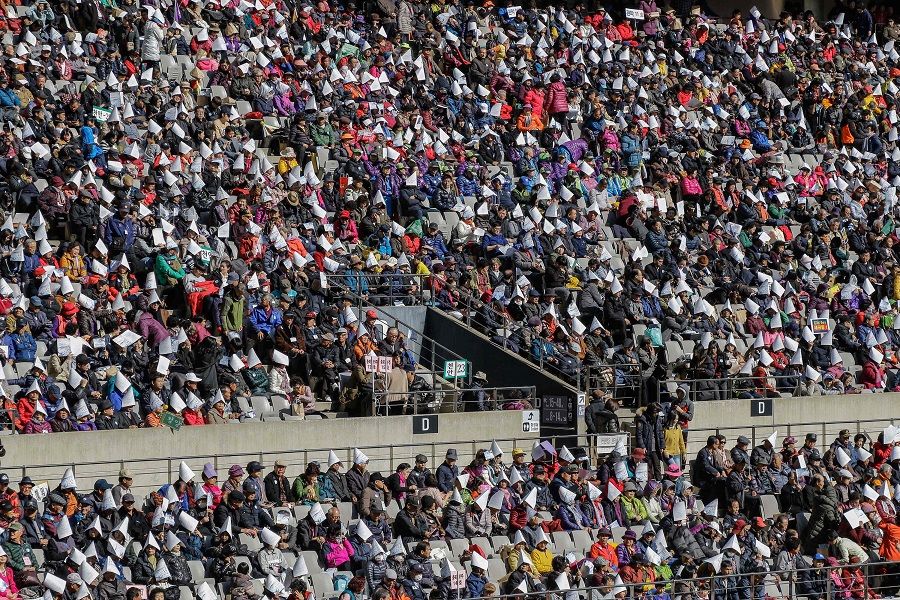
According to an earlier Japanese media report, 150 out of 712 Japanese parliamentarians are associated with the Unification Church, of which 120 are from the LDP. A subsequent survey by the LDP reveals that 179 of the party's 379 parliamentarians have had contact with the Unification Church.
What is particularly shocking is that Abe's younger brother and Minister for Defense Nobuo Kishi has publicly admitted that he is friendly with Unification Church members, who have helped him in the elections. The resultant Japanese public outcry has caused declines in Kishida's approval ratings. As a result, Kishida reshuffled his cabinet ahead of time in August to distance himself from his cabinet colleagues associated with the Unification Church.
Meaningless distinction between LDP's dovish and hawkish factions
From this point of view, Kishida's pandering to the Abe faction and Abe family out of self-interest has probably yielded drawbacks before any benefit.
Founded by Hayato Ikeda, the LDP Kochikai faction from which Kishida has emerged focuses on the economy over the military and has a dovish image. By swiftly deciding to hold a state funeral for Abe, Kishida evidently recognises and approves of Abe's determination and contribution to pursuing constitutional amendment. He has further vowed to inherit Abe's political legacy and to succeed Abe's idea of a free and open Indo-Pacific foreign policy.
The current and future Japanese political environment have rendered insignificant the division or conflict between the dovish and hawkish LDP politicians.
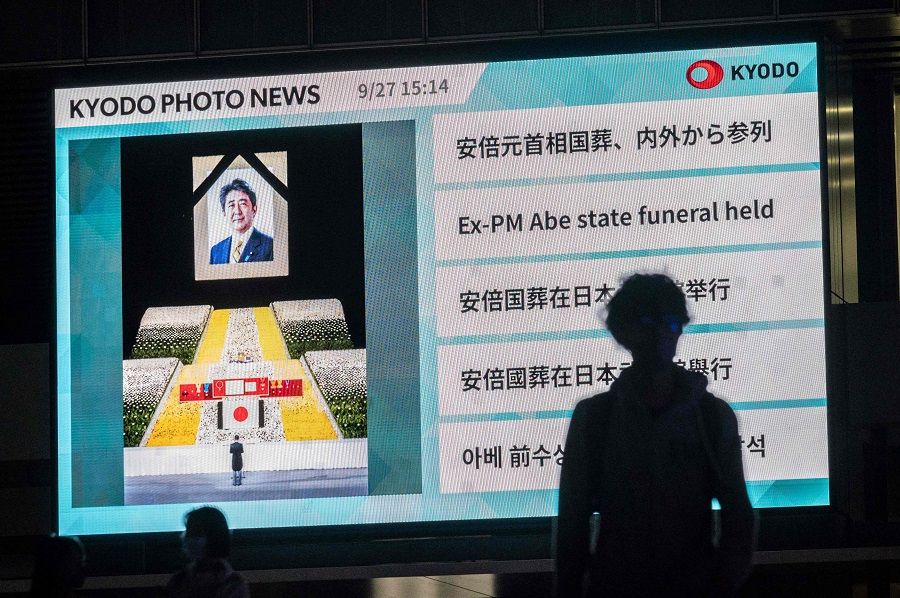
Some believe that Kishida's gestures are merely for expediency and expect him to revert to the Kochikai's original intention to revise domestic and foreign policies after he has consolidated power. However, the upheavals in Japanese politics in the 1990s brought about the collapse of the 1955 System (the dominant party system in Japan that existed since 1955) of the conservatives versus the reformists, which has been replaced by the era of the union of the conservatives (total conservatism or LDP as the big-tent conservative party).
The current and future Japanese political environment have rendered insignificant the division or conflict between the dovish and hawkish LDP politicians. Kishida's declaration when running for the LDP presidency last year clearly indicated that Japan's domestic and foreign policies have nothing in common with the Kochikai's manifesto.
Masayoshi Ohira, a former prime minister and foreign minister in former Prime Minister Kakuei Tanaka's Cabinet in 1972, is credited with facilitating the normalisation of diplomatic ties between China and Japan. Considering the above discussion within our discourse on Japan's Asia-Pacific foreign policies, the review of the 50th anniversary of the normalisation of diplomatic relations between China and Japan and the outlook of China-Japan relations, it is wishful thinking to expect Kishida to revert to or inherit the essence of Ōhira's diplomacy.
Related: Kishida will pick up the baton of Shinzo Abe's dream | Shinzo Abe's first term: A princeling's attempt to rewrite World War II history | Shinzo Abe's second term: Was Abe pro-China? Should the Chinese miss him? | 21st century strategist: Shinzo Abe left an indelible mark on geopolitics in Asia-Pacific | Post-Abe: PM Kishida's challenge to rebuild order within the party
